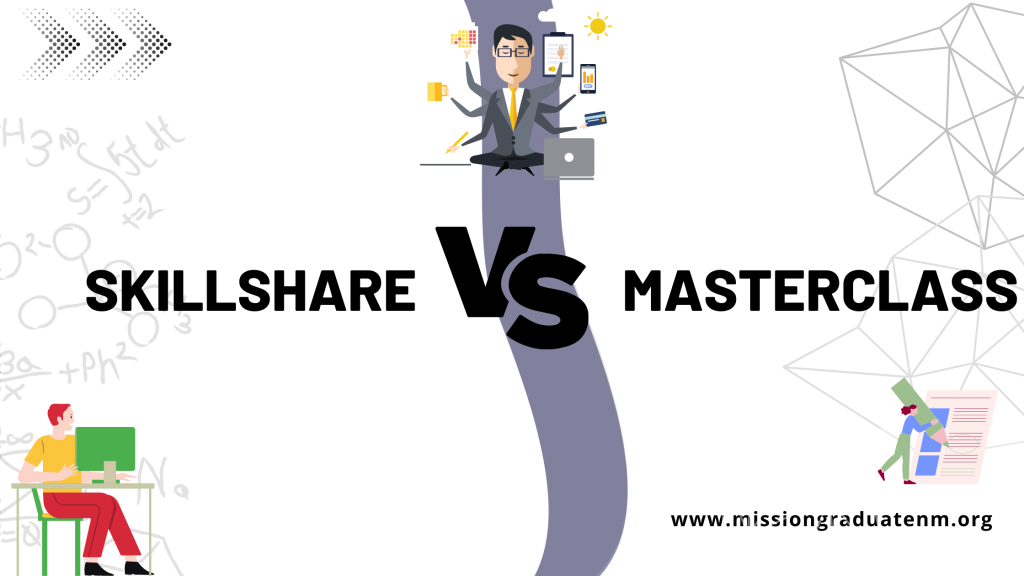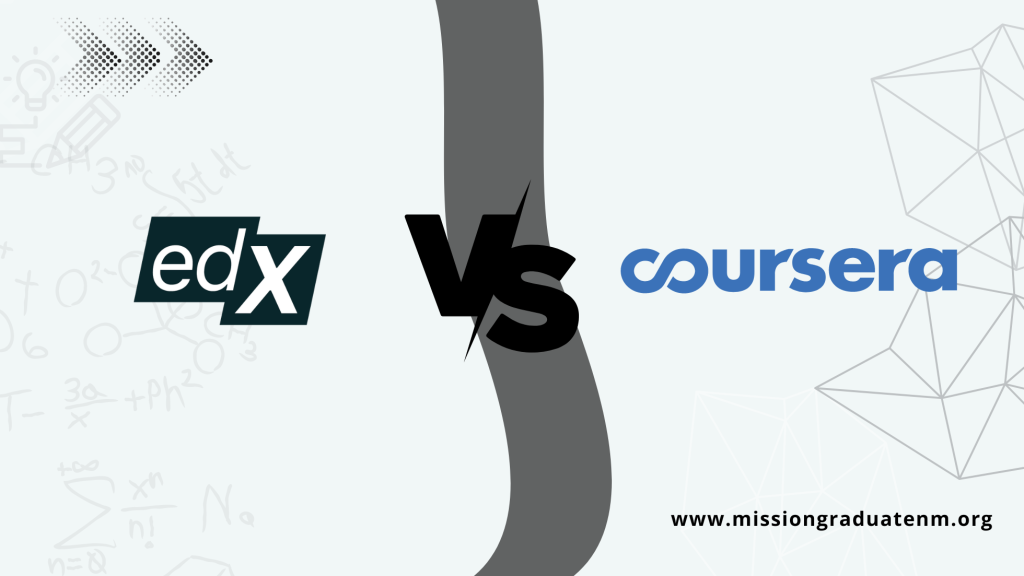In 2025, Coursera and Simplilearn are leading platforms for online education, collectively serving over 140 million learners worldwide. Coursera collaborates with 350+ universities and companies like Google and IBM, offering 10,000+ academic and professional programs.
Both platforms offer compelling options for landing a job, switching careers, or deepening academic knowledge.
But how do pricing, certifications, course quality, and overall value differ?
This detailed comparison breaks down Coursera vs Simplilearn based on features, pricing, instructors, learning experience, and more, so you can decide which suits your goals best.
Coursera vs Simplilearn: Takeaway
Ultimately, the optimal choice will depend on whether one’s objectives are to acquire knowledge or develop job-ready skills. But here are the key factors to consider:
- Coursera partners with leading universities for flexible learning, starting at $59/month.
- Simplilearn provides industry-focused boot camp training emphasizing practical skills, starting at $499.
- Choose Coursera for academic learning or Simplilearn for job-ready skills.
What Is the Difference Between Coursera And Simplilearn?
| Feature | Coursera | Simplilearn |
|---|---|---|
| Free Trial | 7-day free trial (Coursera Plus) | None (some free courses available) |
| Refund Days | 14 days | 7 days |
| Starting Price | $59/month (Coursera Plus) | $499/program (average) |
| Certification | Accredited | Recognized |
| Course Focus | Academic & Professional | Career & Skill-Based |
| Instructor Expertise | University Professors | Industry Experts |
| Learning Experience | Self-paced, academic | Structured, mentor-led |
| Community Aspects | Course forums, peer feedback | Masterclasses, group coaching |
| Production Quality | Varies, generally high | High, with real-world case studies |
Coursera vs Simplilearn reflects their distinct educational philosophies and business models.
Coursera’s university-based approach means more theoretical content and access to cutting-edge research and academic credentials.
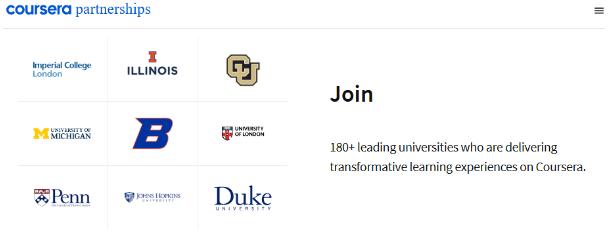
Simplilearn’s industry-focused model prioritizes practical applications and career outcomes, with programs that translate directly into workplace skills and professional certifications.

Coursera and Simplilearn: An Overview
Since its inception, Coursera has grown from a few university partners to over 350 institutions worldwide by 2025. The platform offers over 10,000 courses, specializations, certificates, and degrees.
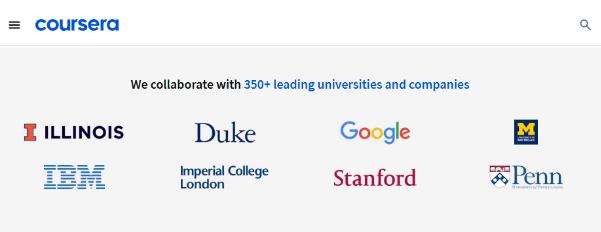
Coursera’s expansion into job-relevant certificates, especially with tech giants like Google, IBM, and Meta, has solidified its role in career advancement while preserving academic foundations.
If you’re considering a subscription, you can check out the Coursera Plus free trial to see what it offers before committing.
Simplilearn has evolved from a project management blog to a boot camp for digital economy skills. Its 2015 acquisition of Market Motive and partnerships with institutions like MIT and Caltech have strengthened its credibility.
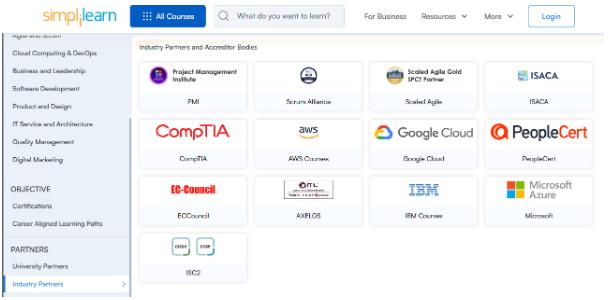
Simplilearn’s unique selling proposition remains its blend of self-paced learning with live virtual classrooms and real-world projects, creating an immersive learning environment with direct workplace applications.
Courses Offered: Coursera vs Simplilearn
The course libraries of both platforms reflect their distinct educational approaches and target audiences. Understanding these differences is crucial for potential learners to align their academic choices with career goals and learning preferences.
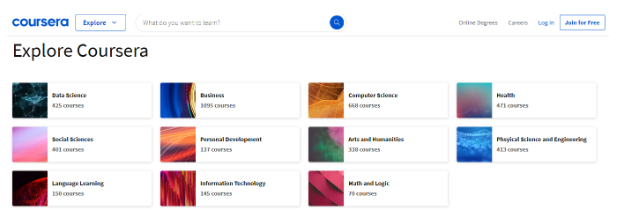
Coursera’s extensive catalog spans disciplines from computer science and business to humanities and social sciences. The platform organizes its offerings into several formats:
| Coursera Course Type | Price Range | Certificate | Course Duration |
|---|---|---|---|
| Free Courses | Free | ❌ | 4-8 weeks |
| Individual Courses | $29 – $99 | ✅ | 4-8 weeks |
| Guided Projects | $9.99 – $19.99 | ✅ | 1-2 hours |
| Specializations | $39 – $79/month | ✅ | 1-3 months |
| Professional Certificates | $39 – $79/month | ✅ | 1-6 months |
| Coursera Plus Subscription | $399/year or $59/month | ✅ | Unlimited access |
| MasterTrack Certificates | $2,000 – $4,000 | ✅ | 4-7 months |
| Bachelor’s/Master’s Degrees | $15,000 – $45,000 | Certificate from the University | 2-4 years |
Most Coursera offerings feature pre-recorded video lectures, readings, auto-graded and peer-reviewed assignments, discussion forums, and optional virtual study groups. Completion timeframes are flexible for most programs, allowing learners to adjust deadlines to accommodate professional and personal commitments.
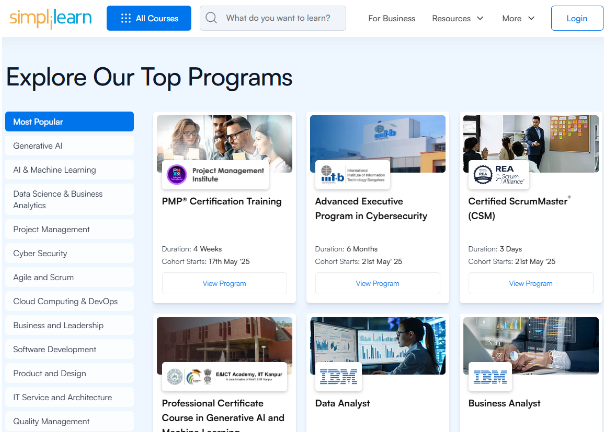
On the other hand, Simplilearn takes a more targeted approach to its course catalog, containing 500+ on-demand courses, focusing primarily on high-demand digital skills and industry certifications. The platform’s offerings are structured around several key formats:
| Course Type | Price Range | Certificate | Course Duration |
|---|---|---|---|
| Free Courses | Free | ❌ | 2-4 weeks |
| Self-Paced Courses | $199 – $699 | ✅ | 1-3 months |
| Short-Term Certification Programs | $799 – $1,499 | ✅ | 2-4 months |
| Online Bootcamps | $999 – $2,499 | ✅ | 3-6 months |
| Professional Certification Preparation | $899 – $1,899 | ✅ (Industry-recognized) | 2-5 months |
| Masters Programs | $1,500 – $3,000 | ✅ | 8-12 months |
| Post Graduate Programs | $3,000 – $8,000 | ✅ (University-partnered) | 6-12 months |
| Corporate Training Solutions | Custom pricing | ✅ | Varies based on the program |
Each program on SimpliLearn includes quizzes, labs, hands-on projects, self-paced materials, video lessons, live classes, and mentorship. Most paid programs provide lifetime access to self-paced components for ongoing reference throughout learners’ careers.
Instructors Comparison: Which Platform Is Better?
Another significant difference between these platforms is the quality of instructors and teaching approaches. It’s important to note that both Coursera and Simplilearn maintain high instructional standards.
However, they differ in their teaching philosophies, academic vs. industry-focused, catering to different learner needs. Here is the difference I noticed on both platforms based on their instructors:
| Aspect | Coursera | Simplilearn |
|---|---|---|
| Instructor Type | University professors | Industry experts |
| Content Focus | Academic, research-driven | Practical, job-oriented |
| Teaching Style | Pre-recorded lectures, quizzes | Live classes, projects, case studies |
| Mentorship | Limited | Strong mentorship & career support |
| Ideal For | Theory-focused learners | Skill-seekers aiming for career growth |
Coursera’s instructors mainly come from academia, including professors from elite schools like Stanford, Yale, and Princeton, ensuring content is research-based. The platform also includes industry practitioners in professional certificate programs.

Instructors present material via pre-recorded lectures, along with readings, quizzes, and peer-graded assignments, adhering to academic conventions and structured assessments.
Simplilearn employs industry experts with extensive experience who offer real-world perspectives. It also features academic professionals for programs developed with universities.
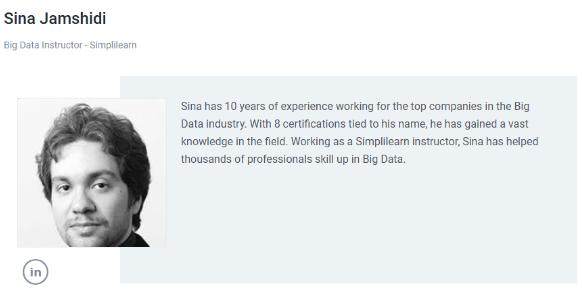
The teaching emphasizes practical applications through case studies, hands-on projects, and interactive sessions. Instructors act as mentors who provide career guidance and technical instruction.
Coursera vs Simplilearn: Pricing Structure
Coursera employs a multi-tiered pricing structure designed to accommodate different learning needs and financial situations, making it accessible to a wide range of users.

Simplilearn operates on a different pricing model focused on complete programs rather than individual courses or subscriptions.
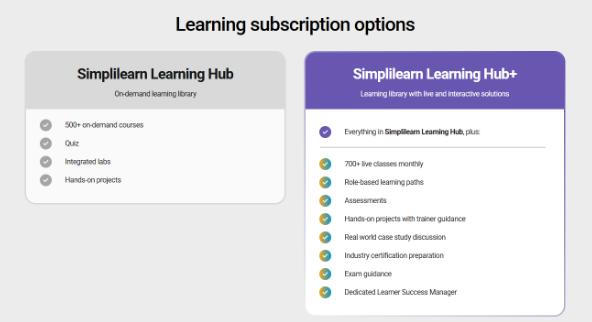
Here is a pricing breakdown for Coursera vs Simplilearn:
| Feature | Coursera | Simplilearn |
|---|---|---|
| Free Courses Option | ✔️ | ✔️ |
| Free Certificates | ❌ | ❌ |
| Individual Course Price | $39–$99 | $199–$699 |
| Annual Plan | $399/year (Coursera Plus) | ❌ |
| Monthly Plan | $59/month (Coursera Plus) | ❌ |
| Professional Certificates | $39–$99/month (subscription-based) | $1,000–$2,500 for full bootcamp packages |
| Special Programs | MasterTrack: $2,000–$4,000 | Post Graduate: $3,000–$8,000 |
| Degree Programs | Online degrees: $15,000–$45,000 | ❌ |
| Masters Programs | Available via partner universities | $1,500–$3,000 (complete career pathways) |
| Refund Policy | 14 days | 7 days |
| Corporate Training | Available via Coursera for Business | Custom pricing based on team and training scope |
Coursera vs Simplilearn Certificate Offerings
Both platforms offer credentials, but their nature and market perception differ considerably.
Coursera certificates derive their primary value from academic association with prestigious universities and companies.
Learn how Coursera’s accreditation enhances the value of its certificates and supports your career growth.

These certificates feature the issuing institution’s name and logo alongside Coursera’s. The platform offers several credential types:
- Course Certificates for individual course completions
- Specialization Certificates for completing series of related courses
- Professional Certificates recognized by industry employers
- MasterTrack Certificates that represent portions of accredited degree programs
- Degree Credentials that are fully equivalent to on-campus degrees
Simplilearn focuses on industry-recognized certifications with direct workplace relevance.
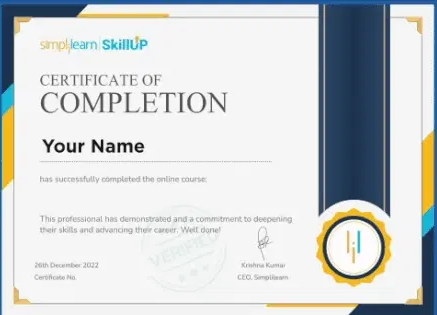
The platform often prepares students for external certification exams while also providing its own completion credentials:
- Course Completion Certificates for all paid programs
- Industry Certification Preparation for exams like PMP, AWS, Scrum, and other recognized credentials
- University-Partnered Certificates featuring the names of academic partners like MIT and Caltech
- Professional Certification through programs aligned with industry standards
- Digital Badges that can be shared on LinkedIn and other professional platforms
Coursera vs Simplilearn: Pros And Cons
Coursera’s strengths and weaknesses reflect its academic roots and broad educational mission:
Pros of Coursera:
- Prestigious university affiliations lend credibility to certificates
- Extensive course library covering diverse subjects beyond just technical skills
- Flexible learning options, including free audit tracks for exploration
- Well-structured academic approach with clear learning progressions
- Multiple pricing tiers including an affordable subscription model
- Financial aid is available for many courses and specializations
- Some programs are eligible for college credit or continuing education units
Cons of Coursera:
- Less direct instructor interaction in most courses
- Varying production quality across different university partners
- Peer grading system sometimes criticized for inconsistency
- Limited live sessions or real-time support in most programs
Simplilearn’s advantages and disadvantages stem from its intensive bootcamp approach and industry focus:
Pros of Simplilearn:
- Strong emphasis on practical skills with immediate workplace applications
- Live virtual classes providing real-time interaction with instructors
- Structured bootcamp format with accountability and milestones
- Industry expert instructors with current professional experience
- Dedicated mentorship and career services in many programs
- Projects designed to build portfolio-worthy demonstrations of skills
- Corporate recognition and partnerships with major employers
Cons of Simplilearn:
- Significantly higher price points for most programs
- Less flexibility in learning schedule due to live components
- More limited subject coverage focused primarily on technical and business fields
- Shorter refund window (7 days versus Coursera’s 14 days)
- No free trial period for most programs
Coursera Or Simplilearn: Which Should You Pick?
The decision between these platforms ultimately depends on your educational goals, learning preferences, budget constraints, and career aspirations. There is no universally “better” platform, only the one that better aligns with your individual circumstances and objectives.
However, if you are still confused here, here are my two cents:
Choose Coursera If
- Prefer credentials from top universities
- Need flexible, self-paced learning
- Want affordable subscriptions
- Are okay with limited live interaction
- Seek degree or certificate pathways
- Like trying free courses before paying
- Are building foundational knowledge
Choose Simplilearn If
- Want hands-on, job-ready skills
- Prefer structured, guided learning
- Value live sessions with experts
- Are preparing for certifications (e.g., PMP, AWS)
- Thrive in fast-paced bootcamp formats
- Aim to switch or grow in tech roles
Alternatives to Consider: Coursera vs Simplilearn
Coursera and Simplilearn are strong online learning options, but other alternatives may better meet your specific needs. The online learning ecosystem has expanded dramatically, with many platforms catering to different areas.
Some focus on disciplines like programming or design, while others emphasize specific teaching methods or credentials. Explore these alternatives to find the best fit for your learning journey:
| Platform | Pricing | Free Trial | Best For |
|---|---|---|---|
| Udemy | $10–$30/course (with discounts) | No (30-day refund) | Budget-friendly, one-off skill learning across various fields |
| LinkedIn Learning | Included with LinkedIn Premium (~$39.99/month) | 1-month free trial | Professional development tied to networking and career goals |
| edX | Free audit; Paid certificates ($50–$300); MicroMasters ($600–$2,000) | Varies by course | University-level academic courses and credentials |
| Pluralsight | $29/month or $299/year | 10-day free trial | Tech professionals seeking skill assessments and structured learning paths |
| Udacity | $399–$999/month (Nanodegree programs) | No (7-day refund) | Project-based learning for in-demand tech careers (AI, data, programming) |
| DataCamp | $25/month billed annually | Some free content | Data science and analytics via interactive, beginner-friendly coding |
| Codecademy | Free basic plan; Pro at $39.99/month | 7-day Pro trial | Beginners learning to code through hands-on exercises |
| 360Learning | Custom enterprise pricing | Demo on request | Corporate learning with collaborative, peer-driven training |
| O’Reilly | $49/month or $499/year | 10-day free trial | Comprehensive tech library (books, videos, labs) for continuous learning |
More Topics Like This:
Final Verdict: Coursera For Academic Learning, Simplilearn For Job-ready Skills!
Choosing between Coursera and Simplilearn depends on your career goals and preferred learning style. Coursera excels in academic focus and flexibility, with affordable access to 10,000+ self-paced programs and credentials from top universities.
Coursera is ideal for learners seeking depth, theory, or advanced degrees.
On the other hand, Simplilearn shines with structured, mentor-led training that delivers immediate workplace value through industry-recognized certifications and real-world projects.
Simplilearn is perfect for professionals focused on upskilling for promotions or job changes.
With 2025 seeing both platforms scale their offerings globally, the right choice ultimately depends on whether you aim for knowledge mastery or rapid career advancement.
FAQs
Neither platform is universally “better”—Coursera offers academic depth and university partnerships at lower prices, while Simplilearn provides intensive industry training with more support but at higher costs. Your choice depends on goals, budget, and preferred structure.
Recognition varies by industry. Coursera certificates gain from university branding, while Simplilearn’s industry-focused programs prepare for recognized certifications, offering immediate credential value in technical fields.
Certificates rarely guarantee employment but show commitment to professional development. Coursera’s university-backed credentials attract academic fields, while Simplilearn’s practical focus creates portfolio-worthy projects that demonstrate skills to employers.
Coursera provides better cost value via its subscription model and free audit options, while Simplilearn’s higher prices are justified by increased support, live instruction, and mentorship. The value depends on the level of structure and guidance you need in your learning journey.
Coursera offers ongoing access to courses via paid certificates or subscriptions. Simplilearn provides lifetime access to self-paced components, allowing long-term content reference completion.
Simplilearn’s bootcamp with career services benefits those needing intensive skill development for a complete career change. Coursera suits gradual transitions, allowing credential building while keeping current employment through flexible scheduling.
